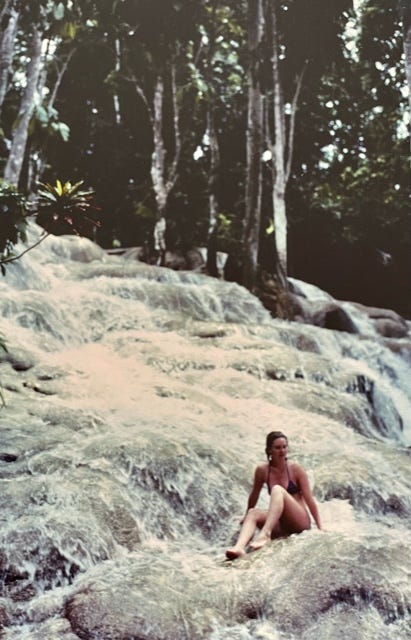The following stories and associated articles were originally published in 2023-2024. I re-edited them for new subscribers. From March 31st to May 9th, I will release these stories twice a week while I’m in Malaysia and China. If you want to support my work, please consider becoming a paid subscriber. Your interactions with these stories and articles will help me deliver the type of writing you want when I’m back from China.
All these stories stand alone but hold more weight for people who read from the beginning.
Each story is accompanied by a cultural psychology or sociopolitical article.
A quick summary if you didn’t start from the beginning.
My father, a wild-hearted seafarer, claimed he knew my mother was "the one" the second he saw her. My brother and I had heard the story before, but this time, it was with his cancer diagnosis hanging in the air.
Back in 1981, my mother stepped off a train in Antwerp to find my father waiting with a feeling she would be there. That "feeling" turned out to be hours of watching trains pass, but it worked.
So, was it love at first sight? Who knows. But when he told her he was heading to the Bahamas and Jamaica a few weeks after knowing her, my mother asked, "Can I come with you?"
It's Easy to Marry in Jamaica: A proposal after six dates.
Catalina
We needed to leave the hollow tones of material ‘progress’ behind.
With metallic groans and grinding protests, the little Honda got us out of the fisherman's port-turned-resort town, Ocho Rios, and into the tropical sanctuary, Konoko Falls.
Around us, flowers in the deep green canopy burst forth in a riot of red, yellow, and purple hues. We inhaled their beauty and then took off our clothes, refreshing ourselves in the embrace of the pools, born of the cascading waterfall. Limestone steps, worn by time, guided the waters' descent, creating a symphony of liquid echoes. Each droplet a fleeting testament to the ceaseless rhythm of nature.
After the scent of damp soil and tropical foliage filled us with energy, we decided to move on.
Your father drove through the mountains so we could see more of the island. Along the way, locals told us to stay on the paved main road and not drive off into the mountains, as it was dangerous—especially for “Whiteys.”
It was hard to believe.
Although Bob Marley was dying of cancer in Miami, his spirit was present throughout Jamaica. We were both aware of the political tensions, particularly between the two major political parties, the Jamaica Labour Party (JLP) and the People's National Party (PNP). However, Bob Marley's music and philosophy of peace and unity seemed to transcend these political divisions.
Still, the locals warned us that if we went too deep into the forest, the chances of whiteys making it out alive were close to none. We heeded their advice.
As we drove further away from the tourist spots, I saw poverty I'd never seen. It was the first time I saw children with protruding bellies from malnourishment, making it difficult to believe the Rastafarian beliefs of equality and social justice were anything more than a pipe dream.
In the evening, we stopped at a bay locally known as Glistering Waters or Luminous Lagoon. Here, microorganisms called dinoflagellates filled the water, emitting a greenish glow when touched. These dinoflagellates left behind magical trails wherever you swam.
We sat on the porch of our cabin and watched the orange sun drip over the Caribbean horizon. Then the stars came out, the infinity of the cosmos laughing above us as the fluorescent light show played its game.
It felt as though the energy of the cosmos aligned, and I was connecting to something beyond myself. The more we talked, the more I felt my soul was binding with another.
I was falling deeply in love.
Back in Montego Bay, we were discussing where to go next, and while browsing through the tourist brochures, I picked up one brochure that claimed, "It's easy to marry in Jamaica."
"Why don't we do that?" I asked Lucas.
On a practical level, it made sense. There was too much politics in Flanders surrounding weddings—there would be nothing but drama. Lucas came from a family full of atheists and socialists, and I came from a family full of conservative Catholics. His great-grandfather risked his life to house Jews, and my great-grandfather signed the agreements—
Well, you know how the story goes.
Anyway, the next morning, we went to the Civil Register of Marriages, above the town's locksmith, and asked Gary, a Jamaican man we befriended in Montego Bay, if he wanted to be one of our witnesses.
Lucas
"Yaw man, mi woulda love fi be yuh witness," Gary says. "An’ mi a go bring mi bredren Alex, too."
I look at Gary’s bare feet, wide with built-in soles from his callouses.
“I need to find nice shoes, man.”
And so, Gary brings us to the notorious Canterbury neighbourhood, where it immediately becomes clear that as a whitey couple without Gary, we have no chance of getting out unscathed.
“Ease up, mon. Dem people are mi fren dem. Yuh like Lambs Bread? Mi a go buy yuh some good Lambs Bread.”
“We have eaten, Gary,” Catalina snaps but stays close to his side.
“Lambsbread a di best ganja inna di world, yuh know. Happy stuff.”
Before I can clarify exactly what he means, he ducks under a tin roof held up by two concrete slabs, one of which we lean against. It is difficult to know if he has entered someone’s home, a communal yard, or is simply part of Canterbury’s maze. Within a minute, he reappears and hands me a brown paper bag with marijuana. He says it is enough for two weeks. To me, it looks like enough for a year. And to Caty, a lifetime.
“Where did you get this?” I ask.
“From yuh odda witness, Alex.”
Although I struggle to comprehend everything Gary says, I understand the witnesses are arranged—hopefully with shoes.
After Gary guides us out of Canterbury, Caty and I head to the cheap hotel we booked in an old colonial building in the heart of Montego Bay.
The only sign of life in the dark reception adorned with aged wooden furniture is the receptionist, an aging Jamaican beauty, exuding sensuality and rhythmically tapping the desk in front of her with long, manicured nails.
“Wah yuh waan?”
“A room for the night.”
She studies Catalina attentively with an approving glance as though she’s ready to hire her for something.
“Tek di stairs, fus door on di lef’. Di bathroom is on di odda side a di hallway.”
It is a spacious room with a worn-out double bed that doesn’t exactly scream ‘Night before a wedding.’ It is humid, too. But not the type of moisture caused by the climate.
“I’m going to take a shower.”
“Strange hotel. Come back quickly.”
I feel refreshed after the shower and find Catalina sitting on the bed, her brows furrowed, like when she’s angry, studying, or sometimes just thinking about what to do next. I’d be worried if it weren’t for the smirk.
“Listen to this. The Jamaican lady asked me if I wanted to earn some money tonight.”
“Earn money?”
“Sex.”
Fuck. I brought my soon-to-be wife to a brothel the night before our wedding.
“Is this a brothel? That can’t be.”
“Oh yes, it is. Put your ear up against the wall over there.”
I walk toward the wall, cup my ear, and listen to exaggerated sex sounds.
“Maybe it’s another happy couple.”
“Sure, where the woman in the relationship earns twenty dollars an hour.”
I search for the best way to say sorry, but Catalina lets out her laugh that could make any of my problems disappear.
“Well, now you can say you slept in a brothel before you got married,” she says.
We cuddle up close. I feel the softness of her thighs, and with my hand on her breast and my nose dug into the small of her neck, I fall asleep to the scent of her sweet skin and coconut-scented hair.
Born Without Borders is a reader-supported guide to building bridges across divides, cultural psychology, and how to salir de las fronteras que impone tu mente. If you want to support my work, the best way is to take out a paid subscription for $5/month or $30/year. You can also Buy Me a Coffee.
All these stories stand alone but hold more weight for people who read from the beginning.
Related Article







